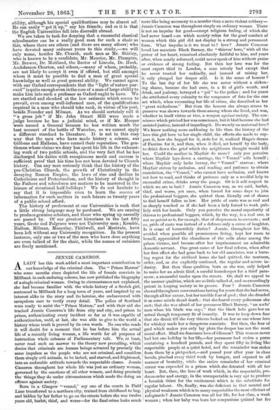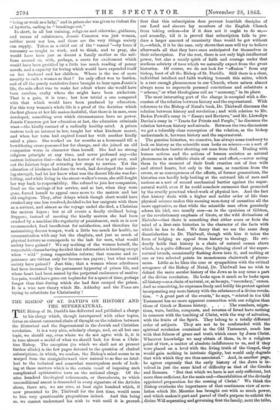JENNI.E CAMERON.
A LADY has this week added a most important contribution to our knowledge of the criminal class. The " Prison Matron" who some months since depicted the life of female convicts in Milbank in such enduring colours, has now published the biography of a single criminal woman. Owing to circumstances not explained, she had become familiar with the whole history of a Scotch girl, sentenced to Ifillbank for a long term of years, and inspired by an interest alike in the story and its heroine, she endeavoured with scrupulous care to verify every detail. The police of Scotland were ready to assist the "Prison Matron," and with their aid she tracked Jennie Cameron's life from city and city, and prison to prison, authenticating every incident so far as it was capable of authentication, until, at last, she was able to give to the world a history whose truth is proved by its own words. No one who reads it will doubt for a moment that he has before him the actual life of a recently living woman, a life worth for all purposes of instruction whole columns of Parliamentary talk. We, at least, never read such an answer to the theory now prevailing, which denies that criminals are human beings actuated by precisely the same impulses as the people who are not criminal, and considers them simply evil animals, to be lashed, and starved, and frightened, into an endurable attitude towards the respectable classes. Jennie Cameron throughout her whole life was just an ordinary woman, governed by the emotions of all other women, and doing precisely the things they do under circumstances which made the doing an offence against society.
Born in a Glasgow " vennel," say one of the courts in Field Lane transferred to a northern city, trained from childhood to beg, and bidden by her father to go on the streets before she was twelve years old, harlot, thief, and worse—for the final crime looks much
more like being accessory to a murder than a mere violent robbery— Jennie Cameron was throughout simply an ordinary woman. There is not an impulse for good—except religious feeling, of which she had never heard— on which society relies for the good conduct of women which this girl did not display in a strong and permanent form. What impulse is it we trust to ? love ? Jennie Cameron loved her associate Black Barney, the "thieves' hero," with all the power of her heart, remained absolutely faithful to him, and years after, when nearly reformed, could never speak of him without praise or evidence of strong feeling. But then her love was for the most expert thief in London, a man utterly bad except that he never treated her unkindly, and instead of raising her, it only plunged her deeper still. Is it the sense of honour ? To the last day of her life she was never without a sicken- ing shame, because she had once, in a fit of girl's wrath, and drink, and jealousy, betrayed a " pal " to the police ; and for years she attributed every calamity to the vengeance of fate for the one act which, when recounting her life of crime, she described as her "great wickedness." But then the honour she always strove to preserve was shown towards those among whom she lived, and was, whether in itself virtue or vice, a weapon against society. The con- science which pricked her was conscience, but it bled because she had assisted justice, instead of impeding it. Do we rely on maternal love? We know nothing more saddening in life than the history of the love this girl bore to her single child, the efforts she made to sup- port it, how she begged for it, stole for it, realized Hngo's dream of Fantine for it, and then, when it died, set herself by the-body, to drink down the grief which the neighbours thought would kill her. Could the mother in Mayfair do more? only you perceive where Mayfair lays down a carriage, the " Vennel" sells herself ; where Mayfair only lacks luxury, the " Vennel " starves ; where Mayfair strives by seclusion, and reading, and patience to obtain consolation, the "Vennel," who cannot have seclusion, and knows not how to read, and thinks of patience only as a needful help to successful crime, drinks away the pangs. -Or is it self-respect to which we are to look? Jennie Cameron was, as we said, harlot, thief, and worse, yet once, when forced for some days to join the professional beggars, she quitted them literally out of shame to find herself fallen so low. Her pride of caste was as real and as sharply touched as if she had been a lady forced to work pub- licly with her hands. Only you perceive the moral superiority of thieves to professional beggars, which, by the way, is a real one, is not so patent as is, for example, that of shopwomen to servants; and so, pride of caste was instead of a defence only a cause of laughter. Is it sense of housewifely duties? Jennie, throughout her life, avoided when possible all promiscuous living, kept her room to herself, appreciated the cleanliness of the cells alone among the prison virtues, and became after her imprisonment an admirable domestic servant. One great cause of her final reform, when after her first effort she had gone back to her old associates, was a burn- ing regret for the civilized home she had quitted, the neatness, order, and, as she explicitly confessed, the regular and severe in- dustry. But then these qualities, born as she was, only helped to make her an adroit thief, a careful housekeeper for a thief para- mour, a successful trader upon the streets. Or, shall we appeal to the meaner qualities, which are so little talked of, and so exceedingly potent in keeping society in its groove. Fear ? Jennie Cameron showed throughout conversations lasting for years that she had never, through all her career, lost her terrible fear of gaol ; that she dreaded it as some minds dread death ; that she feared every policeman she met; that she was afraid of her paramour Black Barney, "an awfu' mon whan his blude was oop ; " that the black hole gave her an actual though temporary fit of insanity. It was to keep down fear that she drank till the very thieves looked on her as one whose love for whiskey made her a dangerous associate. But then, the fear of gaol which makes you only lay plots the deeper has not the most moral effect. Shall we denounce love of idleness? This woman never had but one holiday in her life,—her paramour had stolen a purse containing a hundred pounds, and they spent fifty in living like respectable people at a quiet hotel, and the remainder was stolen from them by a pickpocket,—and passed year after year in close hovels, pinched every third week by hanger, and exposed to all manner of brutality, while the entire remainder of her criminal career was expended in a prison which she detested with all her heart. But, then, the love of work which, in the respectable, pro- duces order and energy, in the unreepectable is very apt to produce a feverish thirst for the excitement which is the substitute for regular labour. Or, finally, was she deficient in that mental and physical weakness which is to many respectables the most efficient of safeguards ? Jennie Cameron was all her life, for her class, a weak woman ; when her baby was born her companions quizzed her for
"being as weak as a lady," and in prison she was given to violent fits of hysteria, ending in " breakings-out."
In short, in all but training, religious and otherwise, guidance, and means of subsistence, Jennie Cameron was just woman, neither more nor less, and those are the very things society can supply. Taken as a child out of the " vennel "—by force if necessary — taught to work, and to think, and to pray, she would have been just as decent a family mother as the mi]- lions around • us, with, perhaps, a crave for excitement which would have been gratified by a little too much reading of penny novels, and a capacity for loving which would have expended itself on her husband and her children. Where is the use of mere severity to such a woman as that ? Its only effect was to harden, and of all the purely restrictive force brought to bear upon Jennie's life, the sole effect was to make her adroit where she would have been careless, crafty where she might have been audacious. That is a gain, it is true ; but how trivial a one compared with that which would have been produced by education. For this very woman's whole life is a proof of the doctrine which the first glance at her life makes doubtful, that there is in man, once developed, something over which circumstances have no power. Jennie Cameron got her education at last, the education criminals want—the kindly contact of a radically healthy mind. A prison matron took an interest in her, taught her what kindness meant, and when her term had expired found her with another kindly mind a place. She worked on for months as a housemaid till a bewildering crave possessed her for change, and she joined an old companion worse in character than herself. She had no strong religious principle at any time, and never professed any—the matron intimates that—she had no horror of vice to get over, and not the faintest hope of retracing her steps to service. Yet the education of kindness had done its work, had developed the resist- ing strength, had let her know what was the decent life she was for- feiting, and while living in the street-walker's room, she still fought her way back to respectability. She refused to join her companion, lived on the savings of her service, and at last, when they were gone, forced herself to appeal once more to the matron and her old employers. They, after delays which though short would have crushed any one less resolved, decided to let her emigrate with them as a servant, and almost as the voyage ended she died, a Christian the matron hopes ; but at all events a finally civilized being. Suppose, instead of meeting the kindly matron she had been crushed by a machine like regularity of punishment, such as is now recommended, food insufficient for satisfaction, and therefore for maintaining decent temper, work a little too much for health, no communication with any but the chaplain, and just as much of physical torture as corresponds to the lash for men, what would society have gained ? We say nothing of the woman herself, the respectable classes having decided that reformation is humbug except when "wild" young respectables reform; that remorse and re- pentance are virtues only for income-tax payers ; but what would society have gained? Just this ; that a woman whose adroitness had been increased by the permanent hypocrisy of prison life, and whose heart had been seared by the perpetual endurance of motive- less pain, would have gone out toplunder for a apace of time, perhaps longer than that during which she had first escaped the prison. It is a wise new theory which Mr. Adderley and the Times are trying to substitute for Christianity































 Previous page
Previous page